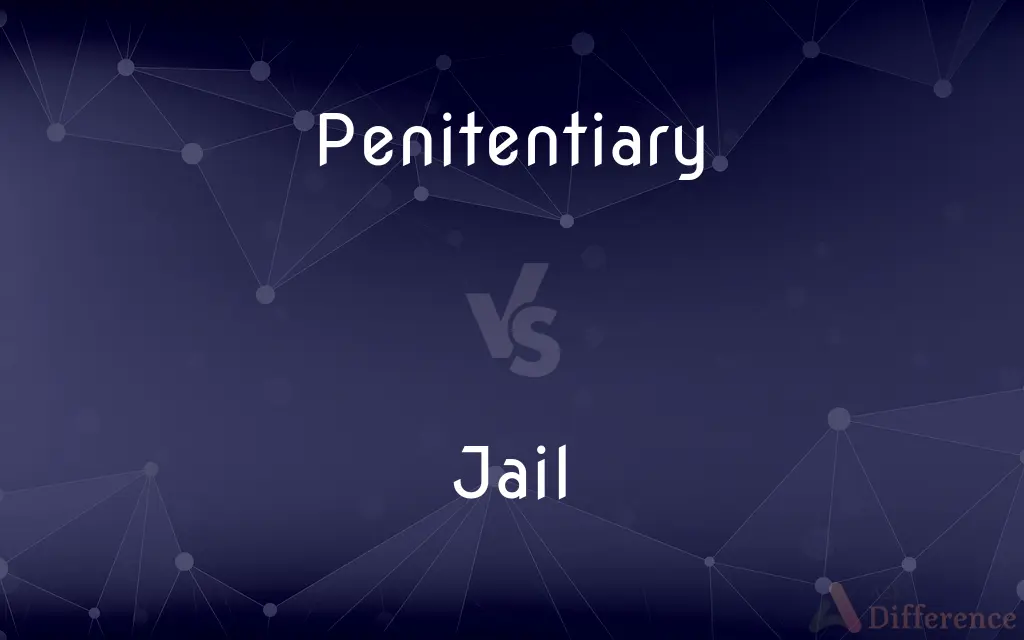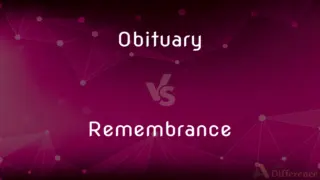Penitentiary vs. Jail — What's the Difference?
By Urooj Arif & Fiza Rafique — Updated on March 11, 2024
Penitentiaries are long-term facilities for serious offenses, while jails are short-term holding for minor crimes or awaiting trial.

Difference Between Penitentiary and Jail
Table of Contents
ADVERTISEMENT
Key Differences
Penitentiaries, also known as prisons, are designed for the incarceration of individuals convicted of serious crimes, typically felonies, and are meant for long-term sentences. These facilities focus on security, rehabilitation, and the fulfillment of sentences that often extend to several years or life. Jails, on the other hand, are local facilities that primarily hold people who are awaiting trial or sentencing, as well as those serving short sentences, usually less than one year, for misdemeanors or minor offenses.
The administration of penitentiaries is usually under state or federal authorities, reflecting their role in housing offenders convicted of more severe crimes. This level of administration is equipped to manage the complexities of long-term incarceration, including security measures, inmate programs, and rehabilitation services.
Jails serve multiple functions, including the temporary detention of individuals awaiting trial, bail decisions, or transfer to another facility. They also accommodate those serving short sentences, making them more transient in nature. This dual role affects their management and the variety of inmate populations they handle.
While both penitentiaries and jails are part of the correctional system, their approaches to rehabilitation and inmate programs can differ significantly. Penitentiaries may offer more structured rehabilitation programs, educational opportunities, and vocational training, aimed at long-term inmate reform and reintegration into society.
Comparison Chart
Sentence Length
Long-term for serious crimes (years to life).
Short-term for minor offenses or awaiting trial (days to <1 year).
ADVERTISEMENT
Jurisdiction
State or federal level.
Local level (county or city).
Purpose
Incarceration of convicted felons.
Holding detainees awaiting trial/sentencing; short-term sentences.
Administration
Managed by state or federal correctional departments.
Operated by local law enforcement or county authorities.
Programs
Offers structured rehabilitation, education, and vocational training.
Limited programs due to short-term nature and diverse inmate population.
Compare with Definitions
Penitentiary
Equipped with stringent security measures for high-risk inmates.
The penitentiary's maximum-security wing contained the most dangerous offenders.
Jail
Primarily for pre-trial detainees and minor offenses.
The local jail held individuals awaiting trial and those serving sentences for misdemeanors.
Penitentiary
Aims at reforming inmates through various programs.
Inmates in the penitentiary could enroll in educational and vocational training programs.
Jail
Managed by county or city law enforcement.
The county sheriff's department was responsible for the operation of the local jail.
Penitentiary
For serious crimes, offering extensive rehabilitation programs.
The penitentiary housed inmates serving multi-year sentences for felony convictions.
Jail
Serves as a temporary holding place for various legal processes.
The jail was used to detain individuals overnight after arrests or until they could post bail.
Penitentiary
Under the jurisdiction of higher-level government bodies.
The state penitentiary was overseen by the Department of Corrections.
Jail
Houses a mix of pre-trial and sentenced inmates.
The jail's population included both individuals awaiting trial and those serving short-term sentences.
Penitentiary
Consists of individuals convicted of felonies.
The penitentiary's population included those convicted of serious crimes like armed robbery and murder.
Jail
Fewer opportunities due to the transient nature of the inmate population.
The jail offered basic education and counseling services, but options were limited.
Penitentiary
A prison for those convicted of major crimes.
Jail
A place of detention, especially for persons who are accused of committing a crime and have not been released on bail or for persons who are serving short sentences after conviction of a misdemeanor.
Penitentiary
A tribunal of the Roman Curia having jurisdiction in matters relating to penance, dispensations, and papal absolutions.
Jail
Detention in a jail.
Penitentiary
A priest whose special function is the administration of the sacrament of penance in a particular church or diocese.
Jail
To detain in a jail.
Penitentiary
Of or for the purpose of penance; penitential.
Jail
A place or institution for the confinement of persons held against their will in lawful custody or detention, especially (in US usage) a place where people are held for minor offenses or with reference to some future judicial proceeding.
Penitentiary
Relating to or used for punishment or reform of criminals or wrongdoers.
Jail
(uncountable) Confinement in a jail.
Penitentiary
Resulting in or punishable by imprisonment in a penitentiary
A penitentiary offense.
Jail
(horse racing) The condition created by the requirement that a horse claimed in a claiming race not be run at another track for some period of time (usually 30 days).
Penitentiary
A state or federal prison for convicted felons; (broadly) a prison.
Jail
In dodgeball and related games, the area where players who have been struck by the ball are confined.
Penitentiary
A priest in the Roman Catholic Church who administers the sacrament of penance.
Jail
A kind of sandbox for running a guest operating system instance.
Penitentiary
(obsolete) One who prescribes the rules and measures of penance.
Jail
To imprison.
Penitentiary
(obsolete) One who does penance.
Jail
A kind of prison; a building for the confinement of persons held in lawful custody, especially for minor offenses or with reference to some future judicial proceeding.
This jail I count the house of liberty.
Penitentiary
(obsolete) A small building in a monastery, or a part of a church, where penitents confessed.
Jail
To imprison.
[Bolts] that jail you from free life.
Penitentiary
(obsolete) An office of the papal court which examines cases of conscience, confession, absolution from vows, etc., and delivers decisions, dispensations, etc.; run by a cardinal called the Grand Penitentiary who is appointed by the pope.
Jail
A correctional institution used to detain persons who are in the lawful custody of the government (either accused persons awaiting trial or convicted persons serving a sentence)
Penitentiary
(obsolete) An officer in some dioceses since 1215, vested with power from the bishop to absolve in cases reserved to him.
Jail
Lock up or confine, in or as in a jail;
The suspects were imprisoned without trial
The murderer was incarcerated for the rest of his life
Penitentiary
Of or relating to penance; penitential.
Penitentiary
Of or relating to the punishment of criminals.
Penitentiary
Relating to penance, or to the rules and measures of penance.
Penitentiary
Expressive of penitence; as, a penitentiary letter.
Penitentiary
Used for punishment, discipline, and reformation.
Penitentiary
One who prescribes the rules and measures of penance.
Penitentiary
One who does penance.
Penitentiary
A small building in a monastery where penitents confessed.
Penitentiary
That part of a church to which penitents were admitted.
Penitentiary
An office of the papal court which examines cases of conscience, confession, absolution from vows, etc., and delivers decisions, dispensations, etc. Its chief is a cardinal, called the Grand Penitentiary, appointed by the pope.
Penitentiary
A house of correction, in which offenders are confined for punishment, discipline, and reformation, and in which they are generally compelled to labor; a prison; a jail. Colloquially often shortened to pen.
Penitentiary
A correctional institution for those convicted of major crimes
Penitentiary
Used for punishment or reform of criminals or wrongdoers;
Penitentiary institutions
Common Curiosities
What kind of programs are available in penitentiaries?
Penitentiaries offer structured rehabilitation programs, including educational and vocational training aimed at long-term reform.
Why do jails have a more diverse inmate population?
Because they hold both individuals awaiting trial or sentencing and those serving short-term sentences for minor offenses.
What is the primary purpose of a penitentiary?
To incarcerate individuals convicted of serious crimes for long-term sentences, focusing on security and rehabilitation.
Can someone serve a long sentence in jail?
Generally, no. Jails are for short-term sentences, usually less than one year, and for holding those awaiting trial or sentencing.
Are penitentiaries and prisons the same?
Yes, "penitentiary" is another term for prison, typically used to refer to higher-security facilities for serious offenses.
How do security levels differ between jails and penitentiaries?
Penitentiaries often have higher security measures due to the nature of the crimes and the length of the sentences of their inmates.
Who typically operates jails?
Jails are usually operated by local law enforcement agencies or county governments.
Can juveniles be held in jails or penitentiaries?
Juveniles are typically held in separate detention facilities designed for young offenders, though in some cases, they may be tried and held as adults.
What role do jails play in the bail process?
Jails are the initial holding facilities where arrested individuals are taken, and bail can be set and posted for their release until trial.
What happens to inmates after serving their sentence in a penitentiary?
They are usually released under parole or supervision, depending on their rehabilitation progress and the nature of their sentence.
How does an inmate's behavior affect their time in a penitentiary?
Good behavior can lead to privileges, participation in various programs, and possibly affect parole eligibility.
Is bail possible for individuals in jail?
Yes, many individuals in jail can be released on bail pending their trial or sentencing, depending on the nature of their charges and legal provisions.
Can inmates in penitentiaries receive visits from family and friends?
Yes, inmates in penitentiaries can usually receive visits, but the policies and schedules for visitation can vary widely.
Are there private jails and penitentiaries?
Yes, there are private facilities in some regions, operating under contracts with governmental bodies, though they are subject to public debate and scrutiny.
Do jails and penitentiaries offer medical care?
Both jails and penitentiaries are required to provide basic medical care to inmates, though the extent and quality can vary.
Share Your Discovery

Previous Comparison
Obituary vs. Remembrance
Next Comparison
Grind vs. GroundAuthor Spotlight
Written by
Urooj ArifUrooj is a skilled content writer at Ask Difference, known for her exceptional ability to simplify complex topics into engaging and informative content. With a passion for research and a flair for clear, concise writing, she consistently delivers articles that resonate with our diverse audience.
Co-written by
Fiza RafiqueFiza Rafique is a skilled content writer at AskDifference.com, where she meticulously refines and enhances written pieces. Drawing from her vast editorial expertise, Fiza ensures clarity, accuracy, and precision in every article. Passionate about language, she continually seeks to elevate the quality of content for readers worldwide.
















































